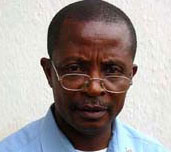Pascal Kabungulu Kibembi, who was assassinated at the age of 55, was a leading human rights activist in the Democratic Republic of Congo (DRC). In the early hours of July 31 2005, armed men broke into his home in Bukavu, eastern Congo, and shot him dead in front of his family. One of the attackers apparently said: “We were looking for you, and today is the day of your death.”
Kabungulu was the secretary general of Héritiers de la Justice, a major human rights organisation in the DRC, and vice president of the regional human rights umbrella group in the Great Lakes, the Ligue des Droits de l’Homme dans la Région des Grands Lacs.
Héritiers de la Justice has a long record of documenting human rights abuses. It denounced those committed by the former dictator Mobutu Sese Seko, when the country was Zaire, and later by the former president Laurent Kabila and the current transitional government, headed by Kabila’s son, Joseph.
It has also documented serious abuses committed by the militias which have terrorised eastern Congo since the civil war broke out in 1998, when Rwanda and Uganda joined forces with Laurent Kabila to topple Mobutu. That conflict has spiralled into a vicious war over control of land and the DRC’s vast natural mineral wealth. More than 3 million people are estimated to have have died in the Congo since 1998.
Kabungulu worked tirelessly for human rights in one of the world’s most violent places – and he did so quietly and efficiently. His organisation worked closely with Christian Aid to expose the use of rape as a weapon of war in eastern Congo and, in May 2002, he went to London to help launch Christian Aid’s report, Listen To Africa. At the launch, Kabungulu shared a platform with Bob Geldof and, although he was nervous about speaking in English, many will remember his moving and eloquent speech. On the same trip, he also met Tony Blair.
Kabungulu’s serene demeanour masked a steely determination, and he was well aware of the risks his job entailed. Other staff members of Héritiers de la Justice had been threatened and killed, and the organisation’s offices had been raided many times. Kabungulu himself was forced into hiding in 2003 after Héritiers de la Justice revealed the name of a military figure who had plundered the country’s mineral riches.
On August 4, two members of les Forces Armées de la République Démocratique du Congo accused of involvement in Kabungulu’s murder escaped from custody, allegedly with the help of the senior army commander who had issued death threats against Kabungulu in the past.
Kabungulu was born in Kamituga, in south Kivu. He took a diploma in linguistics and education from the Institut Supérieur Pédagogique, in Bukavu, in 1978. He was a college professor for many years before joining Héritiers de la Justice in 1994. He wrote numerous reports on human rights in eastern Congo and on the role civil society could play in the reconstruction of the DRC.
He knew the importance of the bulging files in Héritiers’ offices: “One day, when the war ends, we must have a war crimes tribunal so that the people who have committed these crimes are held responsible. Without these documents, this will be impossible.” ( Source Judith Melby, The Guardian)
